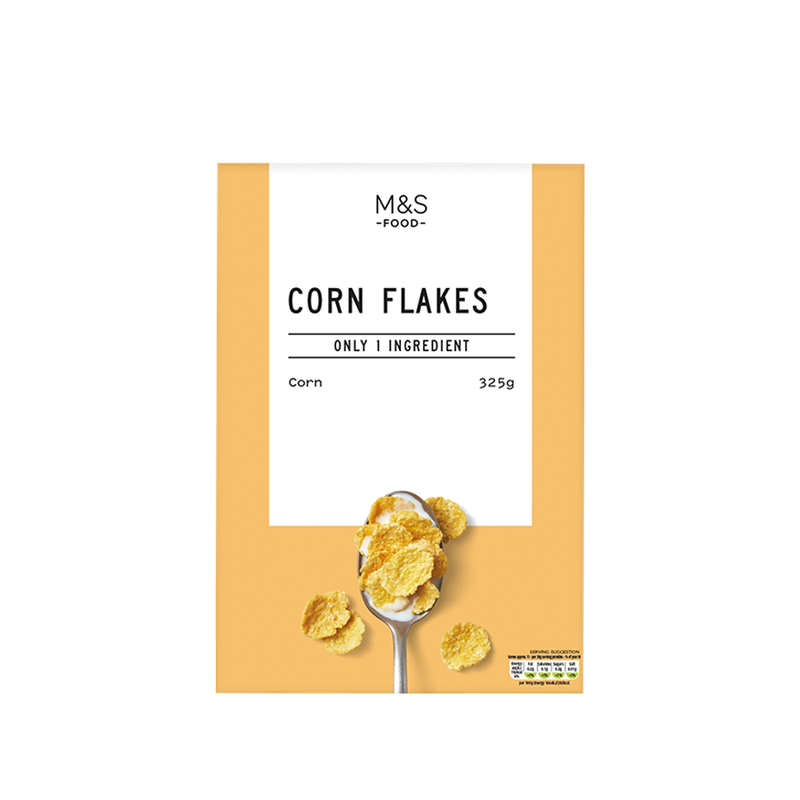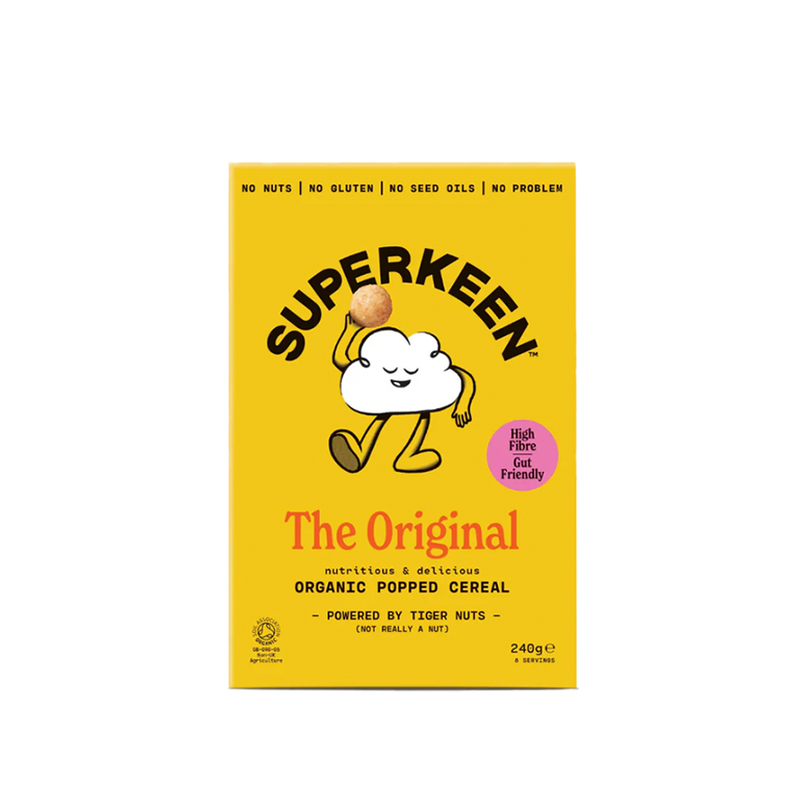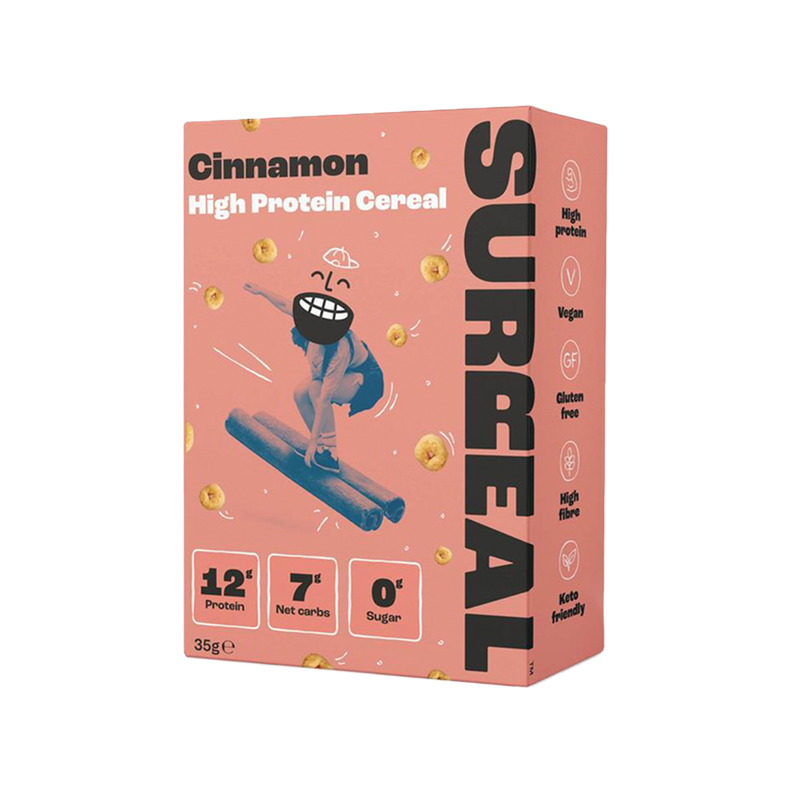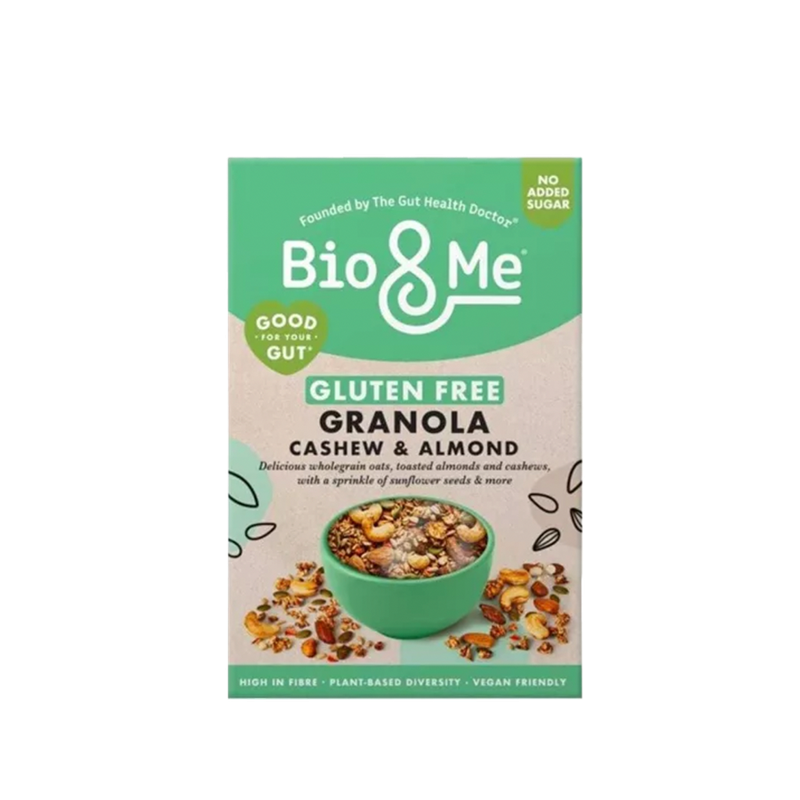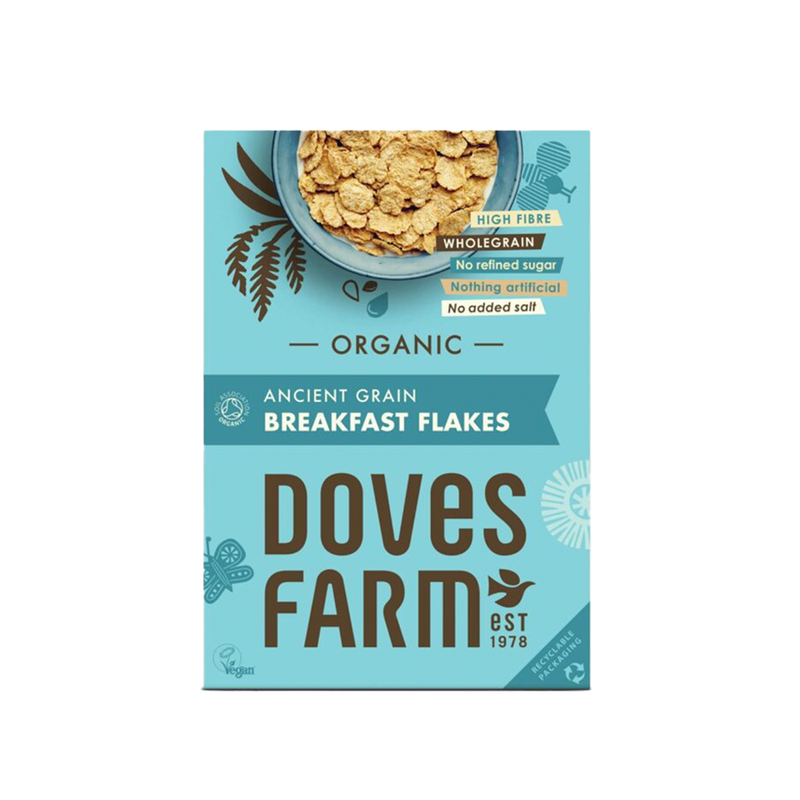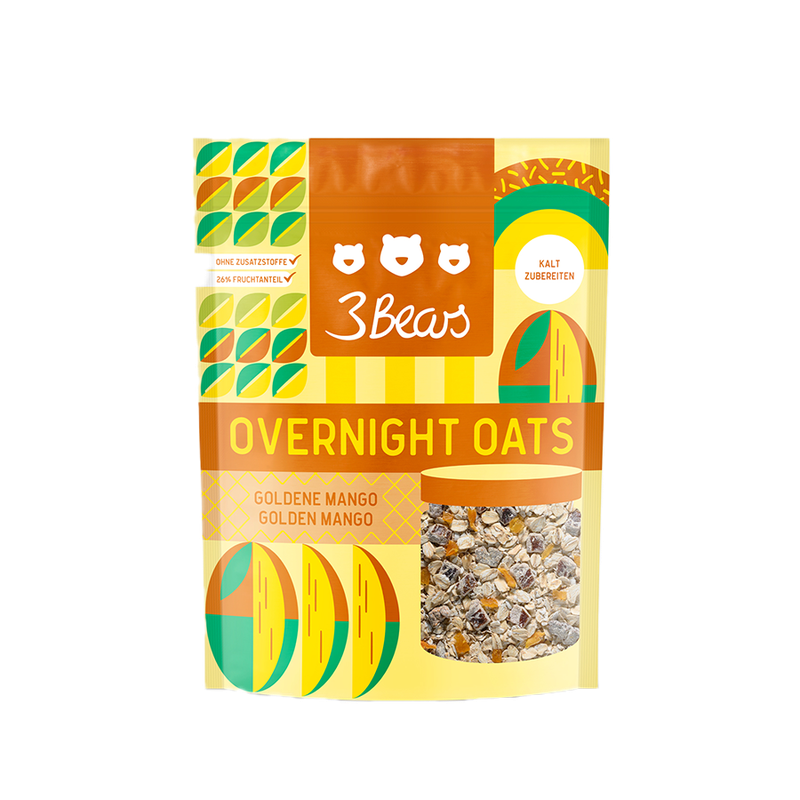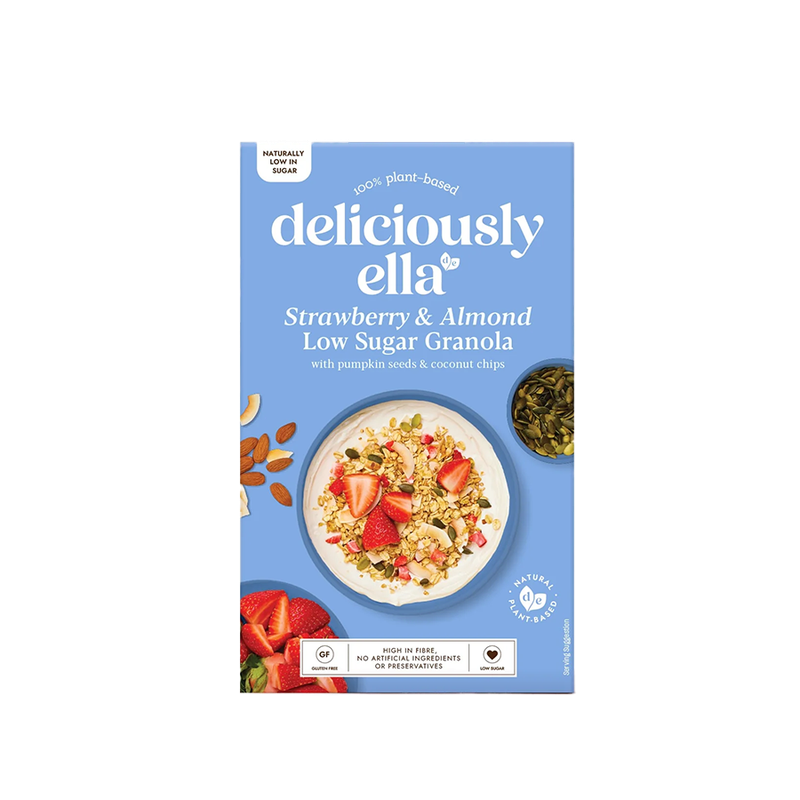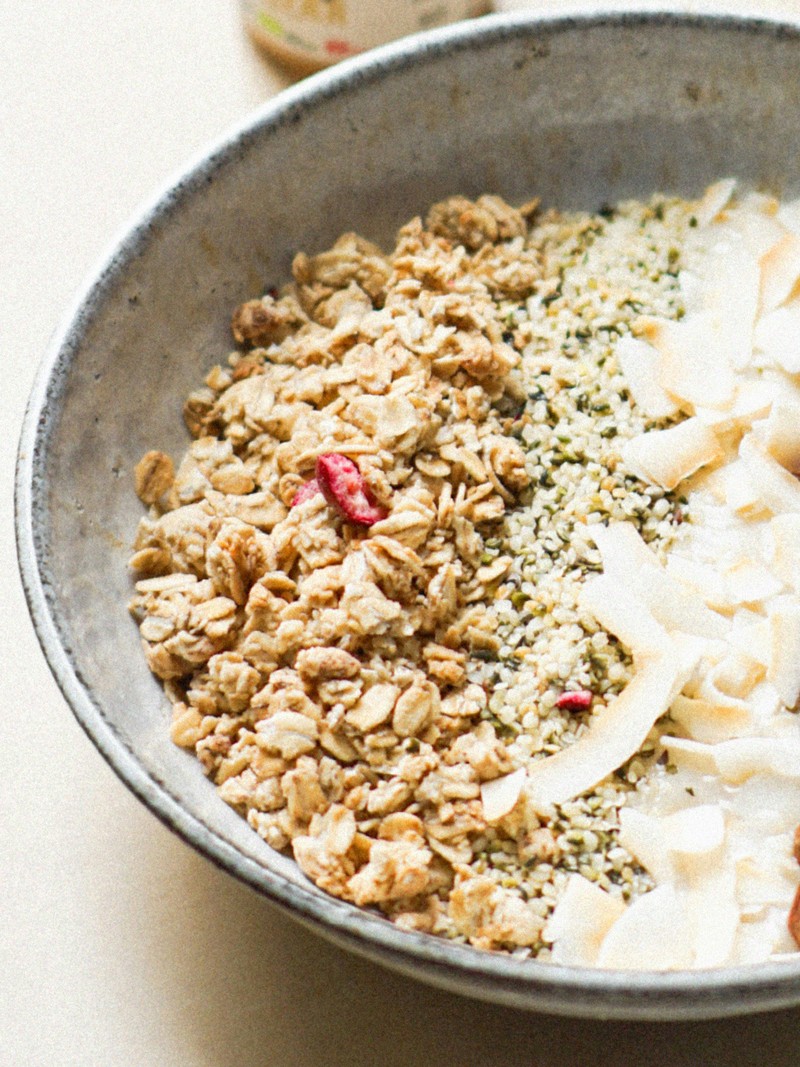
How Healthy Is Your Cereal?
Corn Flakes, £2.50 | M&S
These cereals have gone viral for their ultra-simple ingredient lists – sometimes just one item – but simplicity doesn’t always mean nutritious, says Lucia Stansbie, nutritional therapist. “They’re very low in fibre and fat, mostly just carbs,” she says. “The chocolate hoops in the range are slightly better in terms of protein and fat but still lack fibre. They’re a decent base, but you’ll need to add fruit, yoghurt, nuts or seeds to make it balanced. The body thrives on variety – the more variety in your meal, the better.” Nutritional therapist Xuxa Milrose agrees. “A clean label doesn’t guarantee nutrition. It’s also worth noting these cereals don’t come fortified with vitamins or minerals, so you’ll want to make sure your diet covers those bases elsewhere.”
Available at OCADO.COM
The Original Tiger Nut Popped Cereal Balls, £7 | Superkeen
This newcomer works well for those with allergies, but for Xuxa, it’s not the most rounded option. “If you can’t tolerate nuts, seeds, oats or gluten, this is a solid option,” she says. “But if you can tolerate these foods, you’d be missing out on important nutrients. Super Keen uses cassava and tiger nut flours – high in fibre and relatively clean – but there’s little protein or plant diversity here.” Great for restricted diets but be sure to pair it with protein and healthy fats.
Available at PLANETORGANIC.COM
Cinnamon High Protein Zero Sugar Gluten Free Cereal, £4.95 | Surreal
With nostalgic, sweet flavours, Surreal is a good pick for those wanting a high-protein breakfast. Each crunchy bowl is sweetened with allulose and stevia, giving it the flavour of childhood favourites without the sugar crash. “It’s high in fibre and protein and low in sugar,” confirms Lucia. “For those trying to increase protein at breakfast, it can be a smart option.” That said, it does contain sweeteners, which won’t work for everyone. “It’s an ultra-processed option using novel ingredients,” adds Xuxa. “That doesn’t make it bad – just something to enjoy in moderation.”
Available at SAINSBURYS.CO.UK
Cashew & Almond Granola, £3.95 | Bio & Me
Created with gut health in mind, this range earns high marks from both experts. Lucia praises it for supporting microbiome diversity, thanks to its blend of wholegrains, legumes and seeds. It’s also high in fibre and free of added sugars. “It’s thoughtfully formulated,” says Xuxa. “It’s one of the best options for those prioritising fibre and plant variety,” she says. Just be mindful of portion size – granola can be calorie-dense – but enjoyed in moderation, it’s one of the more nutrient-rich options on the shelves.
Available at SAINSBURYS.CO.UK
Organic Ancient Grain Breakfast Flakes, £3 (was £4) | Doves Farm
Dove’s Farm keeps things simple with organic, wholegrain flakes made from just one or two ingredients. “This is a very minimally processed product,” says Lucia. “It’s organic, high in fibre and great for those who want something simple.” Xuxa echoes this: “There’s a lot to be said for a cereal that’s made entirely from whole ingredients. It won’t suit everyone nutritionally, but if your diet is already varied, it’s a great base.” While not fortified, its clean base pairs perfectly with milk, fruit or seeds.
Available at OCADO.COM
High Protein Cereal Chocolate, £6.99 | Eleat
If you’re looking for a high-protein, low-sugar cereal that’s also gluten-free and vegan, Eleat is a good option. “This is a strong choice if you’re looking for more protein at breakfast,” says Lucia. “It also contains important nutrients like calcium and iron.” However, it’s worth noting it includes sweeteners and isolated fibres. “This is an ultra-processed product and may not suit those with sensitive digestion,” Xuxa cautions. That said, if your gut handles it well, Eleat delivers on fullness and flavour with minimal fuss.
Available at PLANETORGANIC.COM
Overnight Oats - Golden Mango, £5.99 | 3Bears
These ready-to-mix oats are among the cleanest pre-made options, made with whole grains, seeds and fruit. “They’re high in fibre, full of whole ingredients and minimally processed,” says Lucia. Xuxa agrees: “It’s perfect for busy mornings when you still want to prioritise fibre and plant diversity.” Creamy, filling and easy to customise with yoghurt, nut butter or fresh fruit, they’re a weekday saviour for anyone trying to eat better on the go – especially when homemade prep isn’t realistic.
Available at 3BEARS.CO.UK
Strawberry & Almond Low Sugar Granola, £3.80 | Deliciously Ella
With a clean ingredient list and gentle sweetness, this low-sugar granola is a nutritionist favourite. “It’s made with oats, nuts, seeds and touch of date syrup,” says Lucia. “There are no additives and it’s high in fibre.” Xuxa is also a fan: “It’s one of the better granolas out there – whole ingredients, low sugar and no unnecessary extras.” While some granolas rely on syrup or refined oils for crunch and sweetness, this one keeps things simple. Spoon over yoghurt or enjoy with milk for a wholesome start.
Available at SAINSBURYS.CO.UK
Here, the experts share their tips for choosing a nutritionally balanced cereal…
Don’t Be Fooled By Sugar-Free Claims
Just because a label says ‘no added sugar’ doesn’t mean it’s a healthy choice. Both Xuxa and Lucia advise checking the label – you’re looking for less than 5g of sugar per 100g. Watch for hidden sugars like agave syrup, rice syrup and fruit concentrate, all of which will spike blood sugar. “Even dried fruit in muesli can push up the total,” says Xuxa. “Too much sugar in the morning can lead to an energy crash by mid-morning. Always check where sugar appears on the ingredients list. If it’s one of the first few ingredients, it’s a red flag.”
Look For Fibre & Protein
Forget low-calorie claims – what really counts is fibre and protein. A balanced cereal should have at least 6g of fibre per 100g and ideally 10g of protein. “This combination helps regulate blood sugar and keeps you fuller for longer,” says Lucia. Look for cereals made with whole oats, buckwheat, quinoa flakes or spelt, and check the label for added nuts and seeds.
Prioritise Wholegrains
Wholegrains contain more fibre, vitamins and minerals than their refined counterparts, yet most supermarket cereals are made with stripped-back grains. “Wholegrains retain the bran and germ layers – that’s where the nutrients are,” says Xuxa. Always check the first ingredient listed – rolled oats, whole wheat or brown rice are good signs; refined flours, like oat flour, are not.
Don’t Be Afraid Of Simplicity
The viral M&S single-ingredient cereals might be clean, but they’re not automatically healthier. “Minimal doesn’t always mean balanced,” says Lucia. “You still need fibre, protein, healthy fats and micronutrients.” Choose cereals with short but functional ingredient lists – think oats, seeds, nuts and a little dried fruit – and top with yoghurt, kefir and nut butter to round things out.
Consider Fortified Options
Don’t be put off by cereals that are fortified with iron, B12 or vitamin – especially if you’re vegan, vegetarian or don’t eat dairy. “Some of the simpler cereals lack these important nutrients,” says Lucia. “Fortified options can help bridge the gap.”
Be Careful Of UPFs
Even cereals labelled as organic or natural can be ultra-processed. “Cereals with long, unrecognisable ingredient lists are best avoided,” says Xuxa. Instead, choose brands that use real food ingredients and minimal processing – think handmade granolas, or those based on whole grains, seeds and natural binders like date paste or honey. “Remember – not all processed foods are bad for you,” she says. “A muesli made with grains, nuts and seeds and minimal sugars can certainly have its place in the diet – it’s all about balance. The key is to focus on whole, minimally processed options for most of your meals while using processed foods to fill in gaps where needed.”
Look For Plant Varieties
Cereal can be a smart way to increase your weekly plant diversity. “Aim for 30 different plant foods a week for better gut health,” says Xuxa. Choose muesli or granolas with mixed grains, seeds, nuts and dried fruit, or build your own with oats, puffed grains, flaxseed and toppings like chia seeds, tahini and berries.
DISCLAIMER: We endeavour to always credit the correct original source of every image we use. If you think a credit may be incorrect, please contact us at info@sheerluxe.com.
